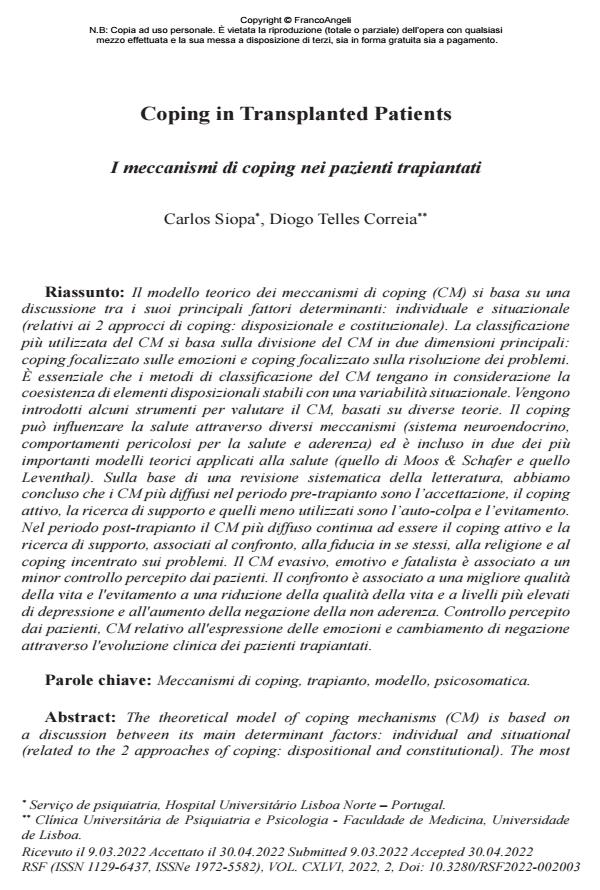Coping in Transplanted Patients
Journal title RIVISTA SPERIMENTALE DI FRENIATRIA
Author/s Carlos Siopa, Diogo Telles Correia
Publishing Year 2022 Issue 2022/2
Language English Pages 15 P. 25-39 File size 161 KB
DOI
DOI is like a bar code for intellectual property: to have more infomation
click here
Below, you can see the article first page
If you want to buy this article in PDF format, you can do it, following the instructions to buy download credits

FrancoAngeli is member of Publishers International Linking Association, Inc (PILA), a not-for-profit association which run the CrossRef service enabling links to and from online scholarly content.
The theoretical model of coping mechanisms (CM) is based on a discussion between its main determinant factors: individual and situational (related to the 2 approaches of coping: dispositional and constitutional). The most used classification of CM is based on the division of CM in two main dimensions: coping focused on emotions and coping focused on problem resolution. It is essential that classification methods of CM have in consideration the coexistence of stable dispositional elements with a situational variability. Some instruments to evaluate CM are introduced, based on different theories. Coping can influence health through different mechanisms (neuroendocrine system, health threatening behaviours and adherence) and is included in two of the more important theoretical models applied to health (Moos & Schafer’s and Leventhal’s). Based on a systematic literature review we concluded that the most prevalent CM in pre transplantation period are acceptance, active coping, seeking support, and the less used are self-blame and avoidance. In post transplantation period the more prevalent CM continue to be active coping and support seeking, associated to confrontation, self-confidence, religion and problem focused coping. Evasive, emotive and fatalistic CM are associated to less control sensed by patients. Confrontation is associated to a better quality of life and avoidance to a reduction of quality of life and higher depression levels and denial to non-adherence increase. Control sensed by patients, CM related to the expression of emotions and denial change through clinical evolution of transplanted patients.
Keywords: Coping mechanisms, transplantation, model, psychosomatics.
Carlos Siopa, Diogo Telles Correia, Coping in Transplanted Patients in "RIVISTA SPERIMENTALE DI FRENIATRIA" 2/2022, pp 25-39, DOI: